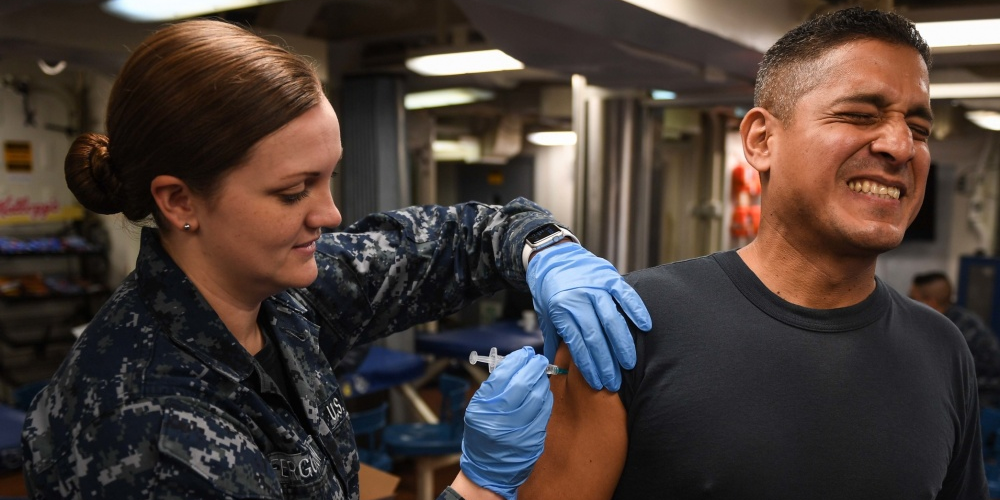
U.S. Navy photo by Mass Communication Specialist 1st Class Theron J. Godbold
- The Pentagon announced plans to distribute a COVID-19 vaccine to US military personnel at a press briefing Wednesday.
- The vaccination process will start with almost 44,000 doses of the Pfizer/BioNTech vaccine, which is expected to get emergency use authorization from the Food & Drug Administration.
- Vaccination will be voluntary initially, as is standard practice with emergency use authorizations, but it could eventually become mandatory.
- Visit Business Insider’s homepage for more stories.
The Pentagon has announced its plan for the vaccination of American forces against COVID-19, a virus that has claimed over a million lives around the world. The vaccine will be voluntary, at least initially.
The Department of Defense said Wednesday that it plans to start the vaccination process by distributing 43,875 doses of the Pfizer/BioNTech COVID-19 vaccine, which is expected to be granted emergency use authorization by the Food & Drug Administration, as part of a “controlled pilot” program.
Vaccines will be distributed at 13 locations in the US and three additional locations in South Korea, Germany, and Japan.
The first US military and civilian personnel to receive the vaccine will be health care providers and support personnel, as well as emergency services and public safety personnel. The vaccine will then be delivered to individuals involved in critical national capabilities and personnel preparing to deploy outside the continental US and other critical staff.
The vaccine will then be distributed to high-risk beneficiaries and, finally, the remainder of the Defense Department population. By that point in the process, the supply should be sufficient to standardize the vaccination process such that it resembles the annual flu shots.
Defense officials said Wednesday that vaccinations will be voluntary initially.
"This is standard practice for an EUA. It is voluntary," said Thomas McCaffery, the assistant secretary of defense for health affairs. "It is going to be voluntary for our forces."
There will be no repercussions for military personnel who do not get vaccinated. "Those who do not get vaccinated, they will be adhering to all of the existing public health mitigation measures that have been in place for months," he said.
But, that could change, chief Pentagon spokesman Jonathan Hoffman said.
He explained that at "some point, if the FDA does decide to fully license the vaccination, at that point, the voluntariness may change to mandatory as determined by the department."
Because US military personnel often live in close quarters or routinely deploy to foreign countries, service members are required to receive a number of vaccinations during basic training and before deployments outside the continental US.
A COVID-19 vaccine may also soon begin to be administered to some members of the general population in the US.
Both Pfizer and Moderna have submitted emergency use authorization applications to the Food and Drug Administration (FDA) for their COVID-19 vaccines.
On Tuesday, the FDA released an analysis of Pfizer and its partner BioNTech's COVID-19 vaccine, stating that it found "no specific safety concerns identified that would preclude issuance" of an emergency use authorization. The analysis suggested that Pfizer's vaccine, which is a two-dose treatment, would begin providing protection against COVID-19 within 10 days after the first dose.
An expert panel is set to meet Thursday to make a recommendation to the FDA on whether to grant an emergency authorization for Pfizer's vaccine. The panel's chair told the Wall Street Journal that "the likelihood of approval is high."
A federal advisory panel to the Centers for Disease Control and Prevention recently recommended frontline health care workers and long-term care facility residents should be the first groups to receive COVID-19 vaccine doses.
The UK approved Pfizer's vaccine last week and began distributing it on Tuesday. Canada approved the vaccine on Wednesday.
On Tuesday, President-elect Joe Biden outlined a three-part plan to combat COVID-19 in his first 100 days, which included completing 100 million vaccine shots during that time period.
